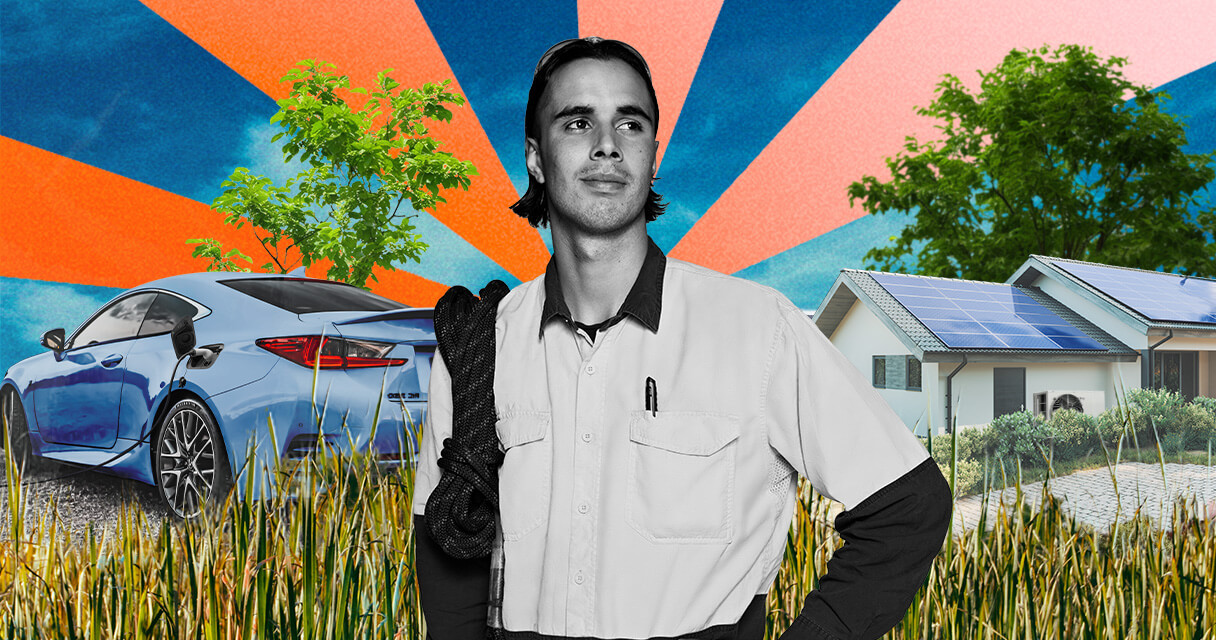CHAMPION
ELECTRICIAN
Up on roofs and on the ground, electricians are on the front line, making the renewable energy transition a reality in homes and businesses across Australia.

Orson King grew up in Bairnsdale, a regional city in Victoria’s south-east, on Gunaikurnai Country. It’s a place that’s fast become a hub for Australia’s renewable energy transition, with wind turbines dotting the Gippsland hills and coast that Orson calls home.
While he’s proud to be making a real difference as part of the energy transition, solar is not something Orson originally set his sights on when leaving school, humbly describing it as “just luck” that he’s working to become a solar specialist.
After spending time as a plumbing apprentice with the local water corp, Orson decided to try something beyond water and pipes. “I knew I wanted to be in a trade when I left school, but didn’t know what,” he says. “A friend of a friend saw an electrical apprenticeship come up and I applied. So yeah, landing in electrical solar was just luck.”
These past four years have been spent working on that apprenticeship with an eye on becoming solar accredited, while also employed by RACV Solar.
“I’m 25, and started my apprenticeship after turning 21,” he says. “If you do that, you’re considered a mature age apprentice, which means you’re paid a bit more because you’ve already got some experience in the workforce.”
“It’s a four-year electrical apprenticeship,” Orson explains. “Once you’ve finished that you’re an electrician, you can install power points, that kinda jazz, then after that you’ve got to be solar accredited to sign off on your own jobs.
“With solar accreditation there are different levels,” he continues. “You’ve got to do your accreditation to install a standard photovoltaic system with an inverter and panels on roof. The next level of accreditation is battery and hybrid, so you’re installing solar and storage with the electricity grid as backup supply. Then the last level is off-grid, where you become accredited to connect a system that can be completely self-sufficient.”
As for the work itself, as you’d imagine, it helps to be comfy at heights.
“There’s a lot of being on the roof, in the roof, running cables, laying panels, mounting inverters, getting the aesthetics right with the customer, then letting them know how to make their home efficient,” Orson explains.
“There’s usually two of us on the roof, two on the ground. Most of us have been installing around three to four years. Everyone knows what they’re doing, but everyone’s learning every day. Some apprentices might have lots of experience on the roof but don’t know how to fit off a switch or install an inverter yet, so everyone knows their roles and strengths, and what they need to spend more time doing. We’re really flexible in that, we want everyone to come out with something valuable. To prove they can do it and get through an electrical apprenticeship and be solar accredited; that’s the main goal. At the end of the day, you want to do a good job, be safe, and go home feeling like you’ve learnt something, enjoyed work and had fun at the same time.”
But for Orson, the goal is also bigger. “I’ve got an 18-month-old little fella, Jahkarri, so looking after my family is definitely number one. I’m of First Nations descent, and trying to be a role model for other Aboriginal kids is something I think about too.”
Something else Orson thinks about is that his work is contributing to the energy transition.
“One hundred per cent. It’s a big thing – bigger than a lot of people realise, and something I dreamt about when I started my apprenticeship four years ago. Renewables are the way of the future.”
Orson King is a Ngarigo/Monero and Gunditjmara man and a fourth Year Electrical Apprentice at RACV Solar. He recently finished his Certificate III in Electrotechnology, and is pursuing his license as an A-grade Electrician.